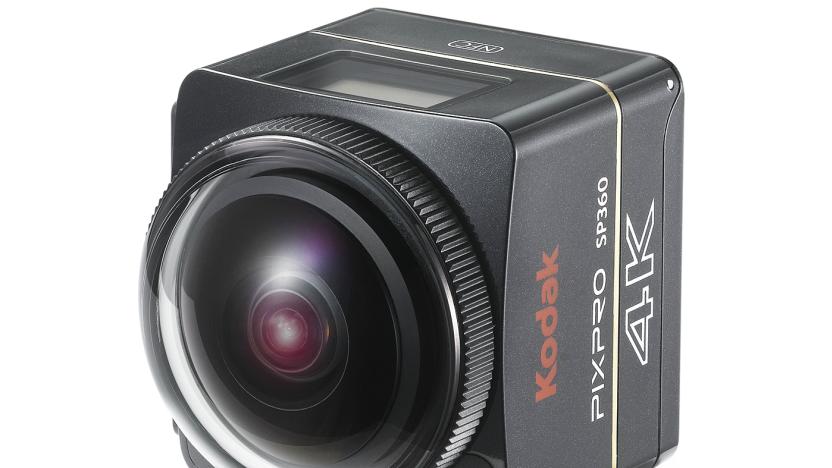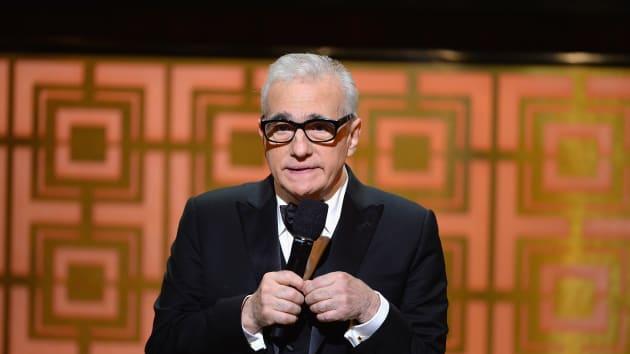kodak
Latest

Kodak's 4K action cam shoots VR-ready videos (in a pair)
Spherical videos have been on Facebook and YouTube for a while now, but they're little more than a novelty. The medium should take on new meaning this year, however, once high-end VR headsets are on the market, which is why Kodak is introducing a 4K action camera today. A successor to the SP360, it's a petite cube with a 12.4-megapixel sensor and a dome-ish lens boasting a 235-degree field of view. It's designed for VR filmmakers and records in two modes -- "global," which captures an almost spherical image 360-degrees horizontally and 235-degrees vertically, or "front," which offers a more traditional wide-angle panorama in 16:9.

Kodak resurrects Super 8 with a new video camera
Kodak hasn't made a Super 8 camera since 1982, however the company announced on Tuesday at CES 2016 that it will debut a prototype video camera designed by Yves Behar that utilizes the venerable analog medium. Citing the preference towards physical media of many Hollywood directors -- including the likes of Steven Spielberg, JJ Abrams and Quentin Tarantino -- Kodak says that it will launch multiple Super 8 cameras, film development services and post production tools as part of its Super 8 Revival plan.

Christopher Nolan goes to war in 'Dunkirk'
His last movie took audiences to the other side of a black hole, but director Christopher Nolan's next project is an altogether different trip back in time. Dunkirk tells the story of one of World War II's early battles, where Allied forces were trapped on a French beach. Remember, this was back in 1940 and they were surrounded by German soldiers -- it wasn't a vacation. As he's part of the lobby that pushed film studios to essentially keep celluloid company Kodak afloat, the movie's naturally being shot on large format 65mm film stock in addition to his favored IMAX 65mm.

Kodak has a new surveillance camera to compete with Nest Cam
Google's Nest Cam, previously known as Dropcam, is without a doubt one of the most preferred home monitoring camera brands. But Kodak doesn't want to be left behind, and today it introduced an upgraded video surveillance camera as part of its CFH-V series. The new model, called the CFH-V20, features a 180-degree field of view, night vision and WiFi capabilities (including a built-in signal extender. It also comes with IFTTT integration, letting you pair the device with third-party automation apps and services, as well as lifetime one-day cloud storage that lets you watch any HD recording from the past 24 hours. Kodak's V20 is available now for $150, which is about $50 cheaper than the Nest Cam.

Kodak and movie studios forge a deal to keep film alive
Good news, die-hard aficionados of movies on film: those reels will stick around for a while yet. Kodak has put the finishing touches on a deal with the six big Hollywood studios (Disney, Fox, NBC, Paramount, Sony and Warner Bros.) that will maintain a steady supply of film for movie and TV directors that want to keep using the classic format. The exact terms aren't public, but it wouldn't be surprising if Kodak had the studios over a barrel. When high-profile directors like Martin Scorsese and Quentin Tarantino virtually insist on film, it's hard to say "no" -- you may as well be telling them to take a hike if you make them go digital. This pact won't stop the gradual death of film in theaters, of course, but creative types can take comfort in knowing that celluloid's hard-to-replicate qualities aren't going away any time soon. [Image credit: Robyn Beck/AFP/Getty Images]

Kodak and Polaroid square off again, this time with smartphones
Kodak and Polaroid are both still fighting for relevance in a world that's mostly left them behind, and this year they've got a new kind of weapon in their arsenals: the smartphone. Both of these companies have basically lent the power of their brands -- the history, the force of nostalgia -- to third-party players who make devices on their behalf. It's a little too early to make a call on which company's definitively doing it better, but we took a look to see how they stack up at this point.

Kodak's finally making smartphones (sort of)
For a while there it looked like Kodak's moment had come and gone, but the past few months have seen the imaging icon fight back from the brink of irrelevance. Now the company's planning to push a Kodak-branded smartphone, and thankfully it's not going to sue everyone in the business along the way this time. To be clear, Kodak won't actually make its own devices -- instead, it's going to farm out most of the development work to an English company called Bullitt (you know, the people behind those uber-rugged Caterpillar phones). Oh, and it won't look anything like the mockup you see above... we hope.

Kodak's new action cam offers 360-degree views of your stunts
Kodak has already thrown its hat into the action cam fray, but its new gadget offers a much wider view of the goings-on. The company's PIXPRO SP360 effort captures footage with 360-degree views in full HD (1080p), which it says is capable of creating "fully immersive images" without having to employ a fleet of cameras. With a dome-shaped fixed lens up top, the diminutive device records the aforementioned video at 30 fps with a 16-megapixel MO sensor, while offering Front (212 degrees), Split (180-degree front and rear views at the same time), Dome (214 degrees) and Sphere (360 degrees) modes for alternative vantage points.

Martin Scorsese voices support for preserving the future of cinema on film
Saving celluloid film is a big deal for many reasons, and the movement recently got another major voice in its corner. Legendary director Martin Scorsese (Raging Bull, Goodfellas, Casino) has come out in support of the Hollywood coalition to save Kodak. In a statement spotted by First Showing, Scorsese notes the advantages of shooting digitally (like lighter and cheaper cameras), but fervently details why film needs to continue to exist, likening the medium to paintings. "Would anyone dream of telling young artists to throw away their paints and canvases because iPads are so much easier to carry? Of course not."

Quentin Tarantino and Christopher Nolan want to save the future of movies on film
The movie industry has seen its share of struggles as we transition into a digital future, and likely no one has felt the pinch more than film company Kodak. The struggling outfit is getting a life-raft, though, in the form of several studios committing to buy a set amount of celluloid per year regardless of if any of their movies are even made using film. As The Wall Street Journal tells it, directors J.J. Abrams, Judd Apatow, Christopher Nolan and Quentin Tarantino -- all who've professed their love for celluloid quite publicly -- were part of the lobbying council for the business deal. Why? Because they adore the look and feel of working with the physical format. Nolan's Interstellar and Abrams' upcoming Star Wars are both being shot on film, but for better or worse, though, these filmmakers are a dying breed.

Time Machines: Say 01100011 01101000 01100101 01100101 01110011 01100101!
Welcome to Time Machines, where we offer up a selection of mechanical oddities, milestone gadgets and unique inventions to test out your tech-history skills. Today the world can easily be captured in 1s and 0s for our viewing pleasure. The hardware behind this capability all started as a DIY lab project in 1974 to test out some new gear, and the result was a Frankenstein-like device that would eventually lead to world-changing advances in photographic technology. Head on past the break for the full story.

Kodak exits bankruptcy with new focus on business imaging
After a year and a half of trials and tribulations, Kodak is finally in the clear -- it just exited Chapter 11 bankruptcy. Now that the company has finished offloading its document and personal imaging groups, it's free to pursue a recently court-approved reorganization plan that focuses solely on business products like movie film and packaging. The resulting firm is a far cry from the camera giant that we once knew, but we may hear about its work in the future. Kodak promises more details of "what's next," and it tells the AP that it's working on technology like printable touchscreen layers and smart packaging.

Kodak expects to exit bankruptcy in Q3 2013
Now with a patent sale, new financing and asset offloads under its belt, Kodak's homing in on when it might emerge from Chapter 11 bankruptcy. In January, the imaging giant predicted it might finally exit its financial default by mid-2013, and now it's filed paperwork with a New York court indicating it's on track to meet that goal sometime during its third quarter this year. In addition to the timeline update, the Plan of Reorganization and Disclosure Statement outlines how the firm's debts have been settled and its future plans, which place heavy emphasis on its commercial imaging business. A hearing for the document and associated strategy is anticipated to be scheduled in mid-June, and creditors will arrange a vote afterwards to decide if everything's to their liking. Kodak's certainly not out of the woods just yet, but it's plodding steadily towards the clearing. [Image credit: Viktor Nagornyy, Flickr]

Apple taking ownership of patents acquired from Kodak
Last year, a group of 12 licensees bid on 1,100 digital photography patents that were being sold by Kodak as part of bankruptcy proceedings. Although the venerable photography company was hopeful that the sale would be enough to help it restructure, the portfolio sold for only US$525 million to the licensees. Those patents are now being transferred from Kodak to licensees including Apple, with the Cupertino company taking ownership of four patents in the last week. The patents being transferred include US Patent Nos. 8,432,479, which deals with range measurement using a zoom camera; 8,432,472, titled "Camera for displaying digital images"; 8,432,456 for a "Digital camera for sharing digital images"; and 8,432,461 for a "Wireless camera with automatic wake-up and transfer capability and transfer status display." In each case, Apple is listed as the assignee of the patent in question. Other companies that will receive patents as part of the sale include Google, Microsoft, Facebook, Samsung, Adobe, Amazon, LG and HTC. Each company receives rights to Kodak's digital imaging patents and other intellectual property, although Kodak also retains rights to use those patents in any future business or subsidiary. Kodak may be edging closer to emerging from bankruptcy; on Monday, the company announced that it will be spinning off the document and personal imaging units to its British pension plan for $650 million.

Kodak offloads its film and scanner businesses to its UK pension group
Kodak may have offered to sell key parts of its document imaging unit to Brother for $210 million, but even that amount is just a small step on the company's long road out of bankruptcy. The company has been looking for a sweeter deal -- and it just found one by settling with its very own UK Kodak Pension Plan. The agreement offloads control of both the document and personal imaging units (read: scanners and film) in return for eliminating a hefty $2.8 billion in claims and receiving $650 million in 'considerations' that include cash. Kodak has already received approval from the UK's Pension Regulator and expects to submit its plans to a US bankruptcy court on Tuesday. We've also confirmed with Kodak that this will supercede the Brother deal as long as it's approved, so there shouldn't be any legal entanglements from changing suitors. As such, Kodak is well on its way to a healthier (if much smaller) company. [Image credit: Pittaya Sroilong, Flickr]

Kodak tentatively sells its scanning business to Brother for $210 million
Kodak as we once knew it has been shedding its identity piece by piece, and today it's selling off key elements of a more familiar cornerstone. The one-time photography legend has made an initial deal to offload assets of its Document Imaging division to Brother for $210 million through a stalking horse bid. If no one else makes a sweeter offer, Brother is likely to take partial control of Kodak's scanning hardware and software in an agreement that's expected to receive bankruptcy court approval by June. It's almost the end of an era for a company that's all too familiar with ending eras -- let's just hope it gets around to starting one of them in the near future.

Kodak closes its digital imaging patent sale, settles disputes
Kodak has had many scary moments in its recent history, not the least of which was wondering whether or not it could sell digital imaging patents to help escape bankruptcy. It's putting some of that trauma to rest now that it has officially closed the recently approved sale. The $527 million deal shares 1,100 patents with a complex web of companies, including Apple and Google, operating under alliances led by Intellectual Ventures and RPX. The buyers intend to use the patents as defenses against imaging-related lawsuits, and they've agreed to settle any remaining legal entanglements with Kodak in the process. Kodak still stands to gain the most from the deal, however: the cash helps repay a large chunk of a key loan, and it reassures the potential financiers that the company needs to leave bankruptcy by mid-2013. We still won't get back the Kodak we once knew, but the name will at least soldier on.

Court approves Kodak financing, could exit bankruptcy by mid-2013
When Kodak filed for Chapter 11 bankruptcy a year ago, the company promised to re-emerge stronger than ever a year later. While that scenario has yet to play out, the gears do seem to be turning: US bankruptcy court Judge Allan Gropper today approved Kodak's bid to borrow up to $844 million from Centerbridge Partners LP. That approval's still conditional, mind you, on the completion of Kodak's recent digital imaging patent fire sale (at "no less than $500 million"). Should that all pan out, the company plans to emerge from bankruptcy by "mid-2013," no doubt worse for wear but better than a few years back.

Kodak-branded S1 Micro Four Thirds camera teased for Q3 launch
Kodak may have had a miserable time of it recently, but there's still hope for those who want a digital camera bearing its hallowed name. JK Imaging, which bought the Kodak brand for its own range of shooters, is announcing the S1 -- a Micro Four Thirds camera that's destined to launch in Q3 of this year. We don't know much about the hardware at this point, except that it'll have built-in WiFi and that it's hinted to carry a Sony-made CMOS. Let's just hope JK Imaging turns out to be a worthy partner. [Image Credit: PC Online]

Judge approves Kodak patent sale to consortium led by Apple, Google
On Friday a judge approved the sale of 1,100 Kodak patents to a consortium led by Apple, Google, and Microsoft. The patent portfolio sold for US$525 million, well below Kodak's hope to get up to $2 billion for the patents. The once all-powerful photography company Kodak is going through bankruptcy in part due to the decimation of its film business with the advent of mass consumer digital photography over a decade ago. The company made the jump to digital too late and could not keep up with other competitors who quickly became leaders in the field. The patents in the portfolio sold off on Friday are "for imaging technology used in digital cameras, smartphones and tablet computers," according to The Wall Street Journal. Besides Apple, Google, and Microsoft, other members of the consortium who bought the patents are Adobe, RIM, Samsung, HTC, Fujifilm, Facebook, Amazon, and Shutterfly.












